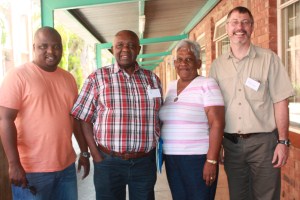Posted on March 01, 2013
Diabetes is a lifelong (chronic) disease associated with raised blood-glucose levels. Although diabetes can nowadays be effectively controlled, it is still a very serious disease that can be fatal. It is extremely prevalent in South African communities and occupies the tenth place on the list of leading causes of death is this country (a clear understatement of the seriousness of this disease).
Diabetes is sometimes called the ‘silent killer’, because the symptoms are not always dramatic and may not even be noticeable.
The Diabetes Clinic at Kalafong Hospital provides medical treatment and care, in accordance with national guidelines, to approximately 500 patients with Type 2 diabetes. However, despite the best efforts to control blood glucose, about 90% of the patients still have elevated HbA1c levels, which means that their blood glucose levels are too high.
This situation has led to the formation of a team consisting of a specialist physician, a psychologist, a pharmacist, a dietician, a social worker, an educationist and a physiotherapist who plan to work together to formulate a multidisciplinary research protocol to address all the important lifestyle issues.
More than 250 Type 2 diabetic patients were invited to participate in the study. From these patients a group of 57 were randomly selected to participate in a six-week programme, while another control group of 57 patients, also randomly selected, will receive standard care followed by the same six-week programme.
On 26 January 2013, when the groups were selected, the following procedures were conducted in respect of every participant: blood was taken to be tested for HbA1c levels and patients were weighed and measured, after which they were requested to complete several questionnaires. The intervention group has organised and attended a series of morning sessions that started on 2 February and will be held on six consecutive Saturdays.
Participants in the research study are provided with information on a specific topic – for instance what the disease entails, how to follow a healthy diet plan, exercise effectively and be well, and how to cope with issues relating to stress. They also meet in focus groups where they discuss their goals for the week ahead.
This programme has been welcomed by all the attending diabetic patients, who declared that they have seen dramatic changes and improvements in their lives since participating in the study. In addition to receiving dietary advice, they have been exposed to healthier cooking methods and also participate in an exercise programme under the supervision of a physiotherapist.
Mr Thomas Mosupye (63), who has been living with diabetes for 23 years, said that taking part in the study had brought some form of reinforcement in his lifestyle. According to him, people living with this condition often backslide from their strict lifestyle, which includes diet and exercise, but the focus groups enable them to share ideas and this has empowered many members of the groups who are participating in the study.
Fifty-three-year-old Jennifer Francis has lived with the condition for 12 years and described the study as life changing. She commended the team’s efforts. ‘What has been put into this programme has really taught me a lot, especially about dealing with stress. This has been very beneficial for me personally,” she said.
Dr Lizette Schoeman, the study co-ordinator at the Kalafong Hospital and the University’s Department of Internal Medicine, explained that the study was initiated because although diabetic patients attending the clinic at this hospital received their medication regularly, their glucose levels remained elevated. She attributed this to inter alia an unhealthy lifestyle.
Since it is often difficult for patients to adopt and adhere to a healthy lifestyle on their own, it is anticipated that participation in this study group will enhance their motivation to change their lifestyle so as to ultimately decrease their blood-sugar levels.
Dr Schoeman also pointed out that another outcome of the study will be that they will be able to identify group leaders who will be able to reach out to their communities. ‘Community members who are participating in this study were well informed about their condition even before they joined the study. They can make a valuable contribution in their communities by sharing information about their condition and encouraging others to change to a healthy lifestyle.’
According to Prof Danie van Zyl, who oversees the Diabetic Clinic, the study has enabled the patients to gain more knowledge about their condition. They aim to encourage patients to take responsibility for their condition and not to depend solely on the health-care provider. He said, ‘This intervention attempts to teach patients how to adjust their lifestyle in order for them to take ownership of and responsibility for their disease’.
The recently appointed Chief Executive Officer of Kalafong Hospital, Mr Mogale Mothoagae, commended the University of Pretoria for taking the initiative, in cooperation with the hospital, to improve the care of people with this chronic condition and to inform the community about the disease. He said that although many medicinal measures have been tried over the years, this type of programme encourages and enables patients to take ownership of their disease.
‘This study will hopefully have a positive impact on members of the community as people will be made aware of the condition and will be empowered in terms of knowing how they can change their lifestyle to prolong life,’ said Mr Mothoagae.

A dedicated team of specialists conducting the study: From left are Marianna Pietersen (lecturer, Department of Sociology), Marlene Gilfillan (dietician at Kalafong Hospital), Dominic Vertue (postgraduate student of Master of Social Work, Health Care, Department of Social Work and Criminology), Dr Lizette Schoeman (Department of Internal Medicine), Prof Danie van Zyl (specialist physician, Department of Internal Medicine), Mr Phillemon Mogashoa (volunteer), Yorke Rodda (educationist on diabetics). Absent: Mighty Mebe (physiotherapist at the hospital).

Diabetic patients listen attentively to the presentations of the multidisciplinary team.

From left - Kalafong Hospital CEO Mr Mogale Mothoagae, diabetic patients Mr Thomas Mosupye and Ms Jennifer Francis, and Prof Danie van Zyl, specialist physician, Department of Internal Medicine.
Copyright © University of Pretoria 2025. All rights reserved.
Get Social With Us
Download the UP Mobile App